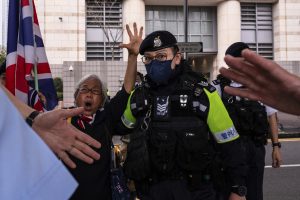On March 19, Hong Kong’s Legislative Council passed the Safeguarding National Security Bill, which took effect four days later. The speed of the legislation’s passage was astonishing: The draft bill was only submitted by the government to the Legislative Council on March 8. The members of the Legislative Council, who had been visiting Beijing at the time of the National People’s Congress, were recalled to Hong Kong to consider the draft. On March 16 and 17, a weekend notwithstanding, the Legislative Council convened and passed the bill with unprecedented alacrity.
Viewed objectively, one struggles to discern any national security loopholes in Hong Kong that needed to be closed with quite that degree of urgency. After all, in 2020, the Chinese government had enacted powerful legislation called the Law of the People’s Republic of China on Safeguarding National Security in the Hong Kong Special Administrative Region (National Security Law), after which it began to round up anti-government activists. The pro-democracy newspaper Apple Daily was shut down. The electoral system was altered, and pro-democracy parties were all but expelled from Hong Kong politics. Anti-government political activities, social movements, and even public discourse have already been extinguished. Indeed, some observers argue that this latest law was not required at all, given the existence of the National Security Law.
Why, then, was it so important to rush this legislation through? It appears that the main reason was to deflect foreign criticism. Western media outlets and politicians had started to criticize the proposed bill. Hong Kong media have speculated that the Chinese government instructed Hong Kong to expedite passage, believing that protracted deliberations would inflame international public opinion and that the West might impose new sanctions on China and Hong Kong.
In fact, for the Hong Kong government, the new law was more about ending the crackdown than strengthening it. Article 23 of the Basic Law of the Hong Kong Special Administrative Region of the People’s Republic of China, which was enacted in 1990 and took effect after the handover in 1997, stipulates that Hong Kong must make its own security laws. This was an obligation placed on Hong Kong by the communist government in response to the Tiananmen Square protests of 1989, as it feared that foreign interference might cause a democratic revolution in China.
The Hong Kong government then sought to pass its own national security legislation in 2002, as required by the 1990 law, but the attempt was scrapped after more than 500,000 people took to the streets in protest. Two decades passed before it felt able to try again. With the passing of the bill, the Hong Kong government now no longer has to keep dealing with the issue of national security, and can focus on the economy. The Chinese government boasts that the National Security Law of 2020 took Hong Kong from chaos to governance. Its next goal is a shift from governance to prosperity.
However, the idea of moving from national security to the economy by passing new legislation that further strengthens national security is unrealistic. Secretary for Security Chris Tang has stated that the new law is defensive legislation that ideally would not need to be used. Indeed, nobody has been arrested (yet) for violating this new law, in contrast to the 2020 National Security Law, the enactment of which was immediately followed by mass arrests. However, the reason for this is the sharp contraction of civil society. According to the Hong Kong government, only 93 of the 13,147 comments from citizens submitted to the Hong Kong government about the bill’s enactment in the first two months of 2024 were opposed to the bill. In a society whose citizens enjoyed freedom of speech, a highly controversial law that controls speech would hardly attract such overwhelming support. Rather, the results reflect a public afraid to speak out or feeling that doing so is pointless. When the government sought public comment on Article 23 of the Basic Law in 2002, nearly 100,000 opinion letters were sent to the Hong Kong government in six months.
The Safeguarding National Security Bill is further diminishing Hong Kong civil society. With the creation of the crime of the possession of seditious publications, which carries a maximum penalty of three years in prison, many citizens worry now about having anti-government books and other materials in their homes. The Hong Kong government emphasizes that possession alone is not a crime unless the book is displayed with seditious intent, asserting that Western media reports that “simply owning the Apple Daily is a crime” are false. However, Ronny Tong, a legal expert and member of the Executive Council of Hong Kong that is the highest advisory body of the government, has advised the public that if they wish to evade suspicion, they should get rid of their copies of Apple Daily. There is no doubt that Hong Kong citizens will take this advice and destroy more books and materials related to the 2019 protests. People are being forced to crack down on themselves before the government overtly does so.
Under British rule, Hong Kong experienced six months of violent riots in 1967, which led to the arrest of many young people. However, the government subsequently regretted the lack of governance that sparked the anti-government movement, granted amnesty to those arrested, and established a golden age during which it earned the support of the people by eradicating corruption and expanding welfare in 1970s.
In contrast, the Safeguarding National Security Bill was applied for the first time on March 25, 2024, just two days after it became law, stipulating that a national security prisoner may not be granted early release, effectively extending the sentences of young people already in prison for such crimes.
For Hong Kong to be able to focus fully on economic development, it will need to improve its relations with the West and restore local trust in government. This latest law looks to be a move in the opposite direction.

































